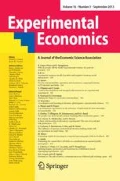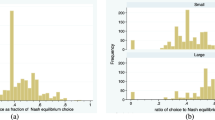Abstract
This paper reports an experiment designed to shed light on an empirical puzzle observed by Dufwenberg and Gneezy (Games and Economic Behavior 30:163–182, 2000) that the size of the foregone outside option by the first mover does not affect the behavior of the second mover in a lost wallet game. Our conjecture was that the original protocol may not have made the size of the forgone outside option salient to second movers. Therefore, we change two features of the Dufwenberg and Gneezy protocol: (i) instead of the strategy method we implement a direct response method (sequential play) for the decision of the second mover; and (ii) we use paper money certificates that are passed between the subjects rather than having subjects write down numbers representing their decisions. We observe that our procedure yields qualitatively the same result as the Dufwenberg and Gneezy experiment, i.e., the second movers do not respond to the change in the outside option of the first movers.
Similar content being viewed by others
References
Battigalli, P., & Dufwenberg, M. (2009). Dynamic psychological games. Journal of Economic Theory, 144, 1–35.
Berg, J., Dickhaut, J., & McCabe, K. (1995). Trust, reciprocity, and social history. Games and Economic Behavior, 10(1), 122–142.
Bolton, G. E., & Ockenfels, A. (2000). ERC: a theory of equity, reciprocity, and competition. American Economic Review, 90(1), 166–193.
Brandts, J., Güth, W., & Stiehler, A. (2006). I Want YOU! An experiment studying motivational effects when assigning distributive power. Labour Economics, 13, 1–17.
Brandts, J., & Charness, G. (2000). Hot and cold decisions and reciprocity in experiments with sequential games. Experimental Economics, 2(3), 227–238.
Brosig, J., Weimann, J., & Yang, C.-L. (2003). The hot versus cold effect in a simple bargaining experiment. Experimental Economics, 6(1), 75–90.
Casari, M., & Cason, T. N. (2009). The strategy method lowers measured trustworthy behavior. Economics Letters, 103, 157–159.
Cason, T., & Mui, V.-L. (1998). Social influence in the sequential dictator game. Journal of Mathematical Psychology, 42, 248–265.
Charness, G., Haruvy, E., & Sonsino, D. (2007). Social distance and reciprocity: an internet experiment. Journal of Economic Behavior and Organization, 63(1), 88–103.
Charness, G., & Rabin, M. (2002). Understanding social preferences with simple tests. Quarterly Journal of Economics, 117(3), 817–869.
Cooper, D. J., & Van Huyck, J. B. (2003). Evidence on the equivalence of the strategic and extensive form representation of games. Journal of Economic Theory, 110, 290–308.
Cox, J. C. (2004). How to identify trust and reciprocity. Games and Economic Behavior, 46, 260–281.
Cox, J. C., & Deck, C. A. (2005). On the nature of reciprocal motives. Economic Inquiry, 43(3), 623–635.
Cox, J. C., Friedman, D., & Sadiraj, V. (2008). Revealed altruism. Econometrica, 76, 31–69.
Cox, J. C., & Sadiraj, V. (2007). On modeling voluntary contributions to public goods. Public Finance Review, 35(2), 311–332.
Dufwenberg, M. (2002). Marital investment, time consistency and emotions. Journal of Economic Behavior and Organization, 48, 57–69.
Dufwenberg, M., & Gneezy, U. (2000). Measuring beliefs in an experimental lost wallet game. Games and Economic Behavior, 30, 163–182.
Falk, A., Fehr, E., & Fischbacher, U. (2003). On the nature of fair behavior. Economic Inquiry, 41(1), 20–26.
Falk, A., & Kosfeld, M. (2006). The hidden costs of control. American Economic Review, 96(5), 1611–1630.
Fehr, E., & Schmidt, K. M. (1999). A theory of fairness, competition and cooperation. Quarterly Journal of Economics, 114(3), 817–868.
Güth, W., Huck, S., & Müller, W. (2001). The relevance of equal splits in ultimatum games. Games and Economic Behavior, 37, 161–169.
Oxoby, R., & McLeish, K. (2004). Sequential decision strategy vector methods in ultimatum bargaining: evidence on the strength of other-regarding behavior. Economic Letters, 84, 300–305.
Servátka, M., Tucker, S., & Vadovič, R. (2008). Words speak louder than money. Working paper, University of Canterbury.
Servátka, M., & Vadovič, R. (2009). Unequal outside options in the lost wallet game. Working paper, University of Canterbury.
Sonnemans, J. (2000). Decisions and strategies in a sequential search experiment. Journal of Economic Psychology, 21, 91–102.
Author information
Authors and Affiliations
Corresponding author
Electronic Supplementary Material
Rights and permissions
About this article
Cite this article
Cox, J.C., Servátka, M. & Vadovič, R. Saliency of outside options in the lost wallet game. Exp Econ 13, 66–74 (2010). https://doi.org/10.1007/s10683-009-9229-5
Received:
Accepted:
Published:
Issue Date:
DOI: https://doi.org/10.1007/s10683-009-9229-5




